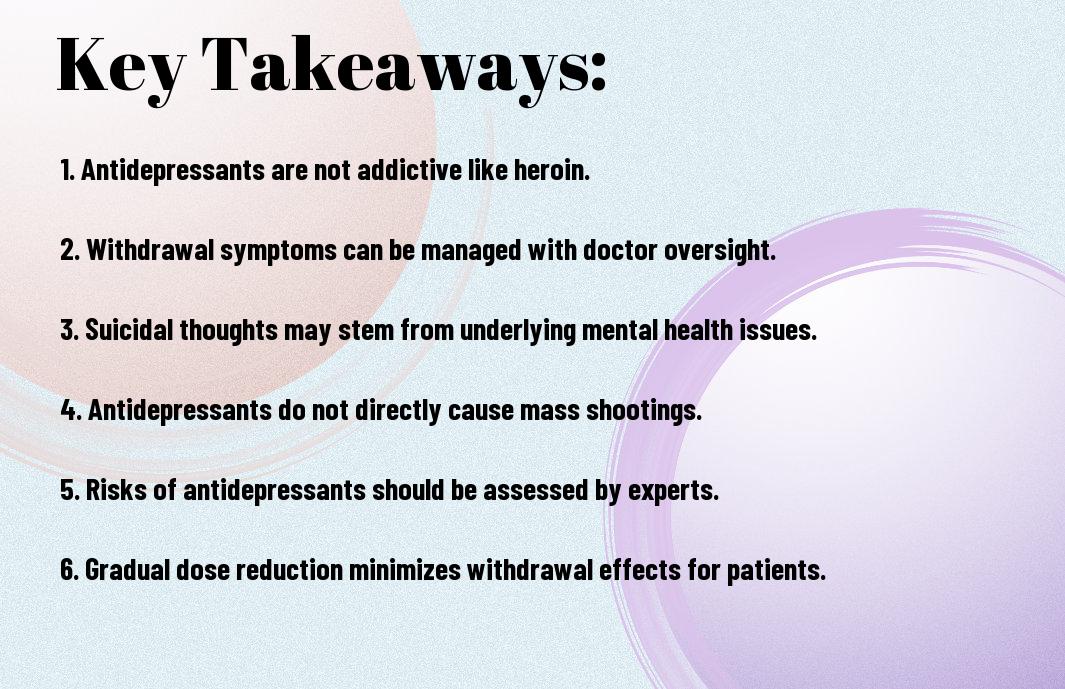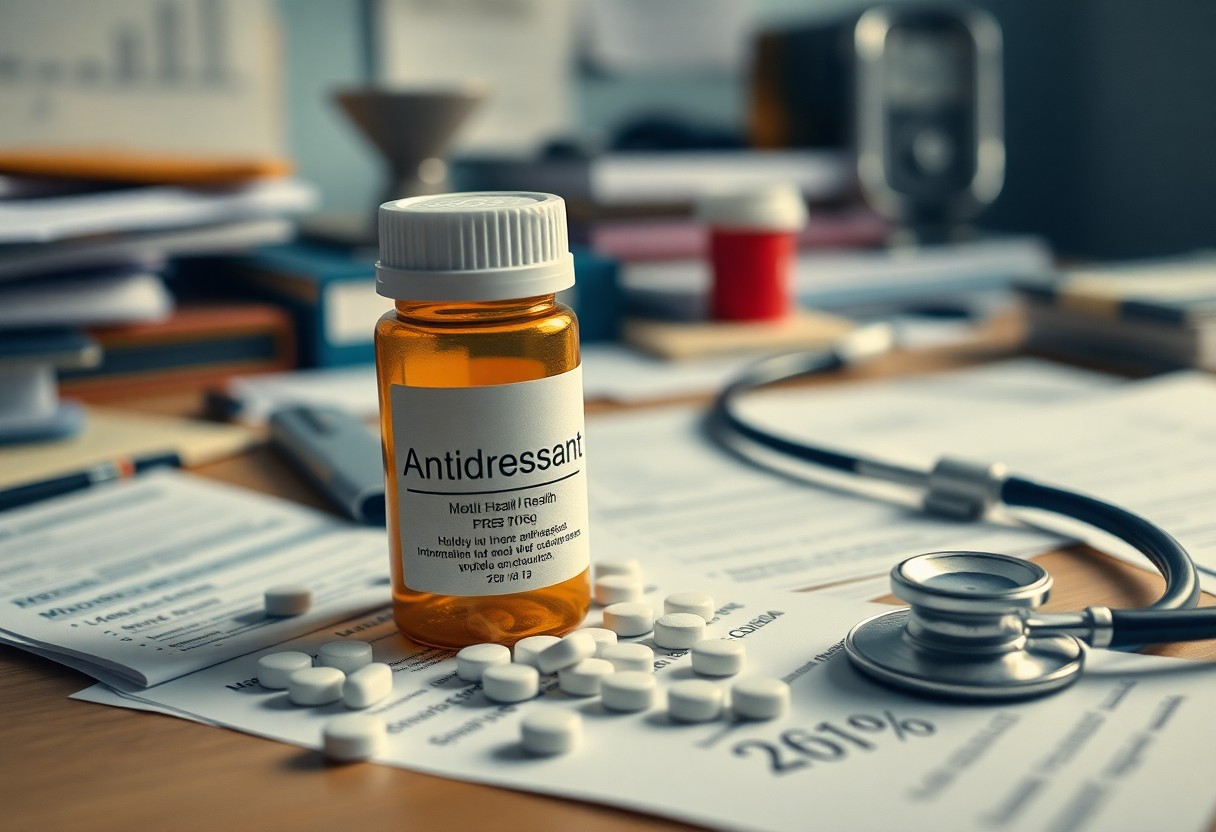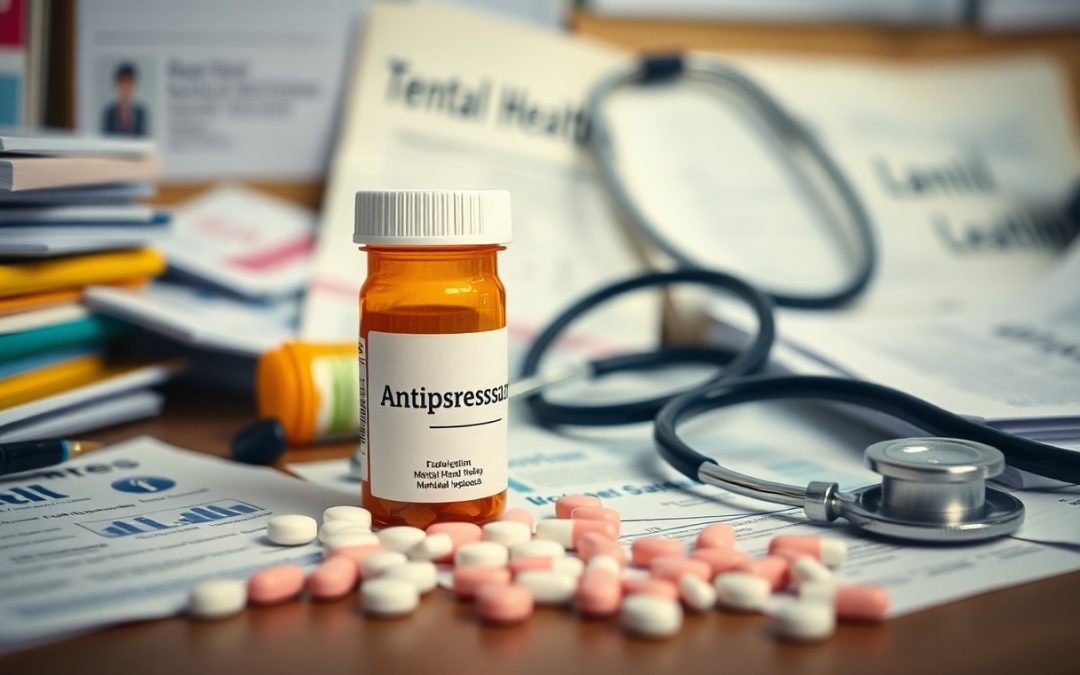It’s necessary to understand that while antidepressants can provide relief for many individuals managing mental health conditions, there are significant concerns surrounding their use. Mental health experts warn you about potential risks, including withdrawal symptoms and the possibility of increased suicidal thoughts among certain populations. As the recently appointed secretary of the Department of Health and Human Services, Robert F. Kennedy Jr. aims to investigate these issues further. Equip yourself with knowledge about these medications, as it may help you make informed decisions regarding your mental health treatment.
Key Takeaways:
- Antidepressants are generally not addictive, with experts affirming that they do not possess the habit-forming potential seen in substances like heroin.
- The risk of suicidality among youth taking antidepressants is low, and any increase in reported suicidal thoughts often reflects a shift in mental state rather than direct causation by the medication.
- Current evidence does not link antidepressants to mass shootings or violent behavior; though rare side effects may occur, they do not justify a direct correlation with violence.

Understanding Antidepressant Safety Concerns
Your concerns about the safety of antidepressants are valid, especially given the various claims circulating about their risks. Many people wonder if these medications can lead to severe side effects or long-term dependency. It’s important to examine these claims critically and understand the scientific evidence that supports or refutes them.
Claims About Addiction Potential
About the potential for addiction, some assert that antidepressants, particularly SSRIs, could be as addictive as heroin. However, leading experts highlight that while withdrawal symptoms may occur if treatment is stopped abruptly, these medications are not habit-forming in the same way addictive substances are.
Scientific Evidence on Dependency vs. Addiction
At the heart of the discussion on antidepressant safety lies the distinction between dependency and addiction. While patients can experience withdrawal symptoms, particularly with abrupt discontinuation, leading experts, including Dr. Ragy Girgis, firmly state that SSRIs carry no addictive potential. Instead, it is the underlying mental health issues that can complicate treatment outcomes.
Scientific evidence demonstrates that SSRIs do not lead to the cravings or compulsive behaviors associated with addiction. While discontinuing these medications can result in uncomfortable withdrawal symptoms, they are generally far less severe compared to those experienced with truly addictive substances like heroin. Furthermore, studies show that effective management of dosage, in collaboration with a healthcare provider, can significantly reduce withdrawal symptoms, affirming that with proper care, these medications can be a safe option for many individuals facing mental health challenges.
Antidepressants and Suicide Risk
The potential link between antidepressants and suicidality is a significant concern for many. While some studies suggest that about 2 percent of teens taking antidepressants may experience suicidal thoughts, health experts emphasize that this doesn’t imply that the medications cause these thoughts. Instead, underlying mental health issues often contribute to these risks, and antidepressants can alter the reporting of suicidality as patients begin to regain their mood and energy.
FDA Black Box Warnings for Young People
Before starting treatment, it’s vital to be aware of the FDA’s black box warnings for young individuals. These warnings highlight the increased risk of suicidal thoughts and behaviors in children and adolescents taking antidepressants. However, the broader context shows that the overall risk of suicide in this population remains low, emphasizing the need for personalized treatment plans.
Distinguishing Between Correlation and Causation
On closer analysis, it’s vital to distinguish between correlation and causation when discussing antidepressants and suicide risk. While some patients report increased suicidal ideation after starting medication, this does not establish a direct cause-effect relationship. Rather, these thoughts may stem from the pre-existing mental health conditions that lead individuals to seek treatment in the first place.
This distinction is important as it highlights that antidepressants can improve individuals’ overall mood and willingness to seek help. Emerging from severe depression often leads to a clearer expression of thoughts and feelings, including suicidal ideation. Therefore, it is the underlying mental health issues, not the antidepressants themselves, that are more directly associated with suicidal thoughts. This perspective is critical for understanding the complex nature of mental health treatment and ensuring informed discussions with healthcare providers.
Withdrawal Symptoms and Management
Once again, it’s necessary to recognize that while many individuals experience withdrawal symptoms when discontinuing antidepressants, these medications are not inherently addictive like substances such as heroin. Instead, you may face temporary physical and emotional challenges that can often be mitigated with proper care and gradual tapering strategies.
Common Withdrawal Experiences
Below are some typical withdrawal experiences that you might encounter, including flu-like symptoms, insomnia, anxiety, and upset stomach. These symptoms can be uncomfortable but are usually short-lived, particularly if you prepare adequately for the discontinuation process.
Proper Discontinuation Protocols
Symptoms of withdrawal can be minimized significantly by implementing a gradual tapering strategy under your doctor’s guidance. This includes slowly reducing your dosage over time instead of stopping abruptly, which could lead to exacerbated withdrawal symptoms. In addition, collaborating with your healthcare provider is key to establishing a tailored tapering schedule that can help you navigate this transition smoothly. Monitoring your emotional and physical health during this process ensures that you maintain a safer and more manageable withdrawal experience. Following a structured plan not only prepares you for potential challenges but also reinforces positive outcomes during your mental health journey.

Antidepressants and Violence Claims
For many, the belief that antidepressants contribute to violent behavior, particularly mass shootings, raises significant concern. However, leading mental health experts emphasize that there is no definitive evidence supporting this notion, suggesting a need for careful examination of such claims.
Examining the Mass Shooting Allegations
Behind these troubling allegations lies a lack of concrete evidence. While some associate antidepressant use with violent incidents, experts clarify that psychiatric medications do not play a direct role in acts of mass violence or homicide.
What Research Actually Shows
What you need to know is that studies indicate antidepressants can occasionally lead to side effects such as emotional blunting or mania, but these occurrences are rare and do not imply a direct causation for violence. Experts assert, “There is no evidence to suggest that antidepressants, or any psychiatric medications, play a role in mass shootings or homicide.” This insight is vital in mitigating fear and misinformation surrounding mental health treatments.
Benefits of Antidepressants
Unlike the perception that antidepressants are solely harmful, they can significantly improve mental health for many people. Used properly, these medications can alleviate depressive symptoms, enhance emotional regulation, and promote overall well-being in patients struggling with their mental health. When prescribed and monitored by professionals, antidepressants can serve as an effective tool in the journey toward recovery.
Effectiveness for Depression Treatment
Any discussion about antidepressants’ benefits starts with their effectiveness in treating depression. Studies show that these medications can reduce symptoms in many individuals, with a significant percentage experiencing noticeable improvements in their mood and energy levels.
Quality of Life Improvements
An important advantage of antidepressants is the potential for enhanced quality of life. Many individuals report improved daily functioning, more fulfilling relationships, and a greater ability to engage in activities they enjoy after starting treatment.
Consequently, by alleviating depressive symptoms, antidepressants can decrease social withdrawal and increase motivation to engage with others and partake in hobbies. As you experience these positive changes, your overall life satisfaction may rise, leading to better relationships with family and friends, greater productivity at work, and a more positive outlook on life. Investing in your mental health with antidepressants can foster stronger emotional connections and promote a healthier lifestyle.
Safe Use of Antidepressants
Despite concerns surrounding antidepressants, when used correctly and under the right circumstances, they can play a significant role in managing mental health conditions. It is vital to approach treatment with a thorough understanding; this includes knowing potential side effects and recognizing that these medications are not habit-forming. Engaging with a healthcare professional ensures that you have reliable guidance throughout your treatment journey.
Importance of Medical Supervision
Below, it’s important to emphasize that mental health medications should always be taken under the supervision of a healthcare provider. Your doctor can help evaluate your specific situation, balance the benefits risks of antidepressants, and monitor any adverse reactions. This oversight helps ensure both safety and effectiveness during the course of your treatment.
Monitoring and Adjusting Treatment
Across your treatment journey, ongoing monitoring and adjustments may be necessary. Your doctor will track your progress and may alter your dosage or change your medication based on your response and any side effects you experience. This adaptability enhances the likelihood of achieving the desired therapeutic effect while minimizing negative outcomes.
In addition, monitoring your progress allows for fine-tuning the treatment plan to match your evolving needs. Regular check-ins with your healthcare provider help identify and address any potential issues early on, ensuring that your mental health is actively supported. If you experience any withdrawal symptoms or changes in mood, adjustments to your treatment can make all the difference. Close collaboration with your healthcare team is vital for your safety and well-being as you navigate antidepressant therapy.
Summing up
Upon reflecting on the discussion surrounding antidepressants, it’s important to understand that while concerns exist about their effects, mental health experts emphasize the need for a balanced view. You should be aware that antidepressants are not inherently addictive and do not directly cause suicidal thoughts or violent behavior in most cases. Instead, they can help improve your mood and encourage you to seek support. Engaging with healthcare professionals can help you navigate these complexities and ensure safe treatment tailored to your needs.


